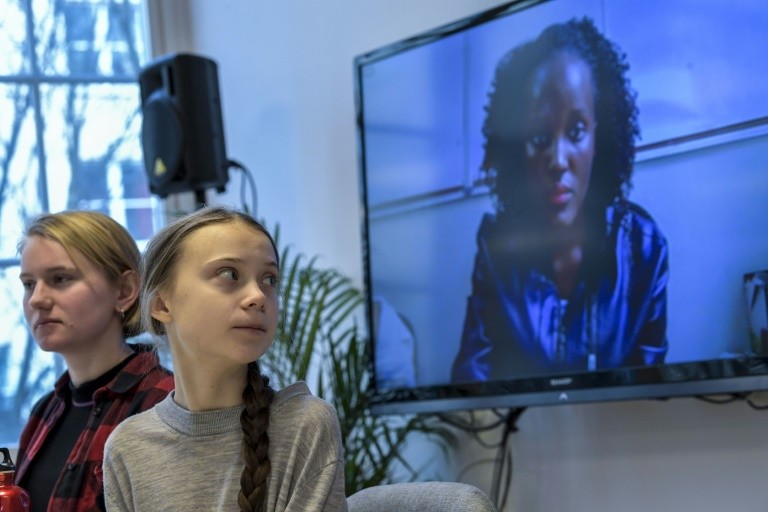After a racism debate in Davos on the invisibility of African climate activists, Greta Thunberg held a press conference Friday with fellow eco warriors from Kenya, Uganda and South Africa to stress the importance of their voices.
Vanessa Nakate of Uganda was at the heart of a viral debate at the World Economic Forum in Davos after she was cropped out of a news agency photo of young activists, including Thunberg, taken after a press conference.
A 23-year-old graduate in business administration, Nakate was the only black person and only African in the photo shoot.
She accused the Associated Press of racism in cropping her out.
The agency said the photographer had modified the photo for composition purposes and later apologised, calling it a “terrible mistake”.
Nakate said she did “not want to talk about” the incident, other than to say that “it was quite a frustrating moment.”
 TT News Agency/AFP / Pontus LUNDAHLSwedish climate activist Greta Thunberg at the press conference in Stockholm with other participants on screen
TT News Agency/AFP / Pontus LUNDAHLSwedish climate activist Greta Thunberg at the press conference in Stockholm with other participants on screen“This is the time for the world to listen to the activists from Africa and to pay attention to their stories… This is an opportunity for media to actually do some justice to the climate issues in Africa,” Nakate told reporters via video link from Kampala.
She was joined on separate screens by Ayakha Melithafa and Ndoni Mcunu of South Africa and Makenna Muigai of Kenya, who spent an hour answering questions from journalists gathered at Greenpeace Sweden’s offices.
– ‘We are the most impacted’ –
So far, Africa is relatively blameless when it comes to climate change.
The continent is home to 17 percent of the world’s population and more than a quarter of its nations, but only accounts for about five percent of the greenhouse gas emissions pushing the planet toward runaway warming.
 AFP / Isaac KasamaniNakate, speaking in Kampala: “This is the time for the world to listen to the activists from Africa”
AFP / Isaac KasamaniNakate, speaking in Kampala: “This is the time for the world to listen to the activists from Africa”“Yet we are the most impacted” by climate change, said Mcunu, a PhD student at Johannesburg’s Witwatersrand University.
“Almost 20 million people have fled the continent due to these changes” and major droughts have caused “almost 52 million people to become food insecure,” she added.
Mcunu said Africans have begun to adapt, using “indigenous knowledge systems” incorporating “the knowledge that we have as Africans into the international research science and climate data awareness”.
But, she stressed, “how is it that we’re not being spotlighted in these stories, that’s the main challenge we have as a continent.”
Billions of locusts are swarming through East Africa, the result of extreme weather swings which could prove catastrophic for a region still reeling from drought and deadly floods.
If unchecked, the infestation could become a plague that will devastate crops and pastures in a region which is already one of the poorest and most vulnerable in the world.
– ‘Food and water scarcity’ –
Many Africans “are unaware as to why this is happening, due to not being educated and properly prepared for the consequences,” said Makenna Muigai.
“I urge African leaders and world leaders to take into consideration that all of us will be affected by climate change. No one should be left behind,” she added.
“The biggest risk that African countries face would be food scarcity and water scarcity, as a result of climate change,” added Nakate. To combat these threats, activists’ voices need to be heard.
“The biggest threat to action is the fact that those who are trying as hard as possible to speak up are not being given the amplification, they’re not able to tell their stories,” Nakate said.
“If we continue the silencing of planet activists from different parts of Africa, it will be so hard for them to get their message across to our government leaders.”
Thunberg meanwhile criticised the media for focusing so much of its attention on her, insisting “the African perspective is always so under-reported”.
“If I say something it gets turned into a headline, that is not the case for the others. The media frames us differently… the amount of coverage they give us,” the Swedish teenager said.
AFP

